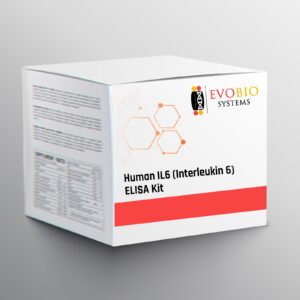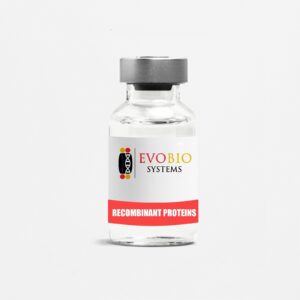Showing 10–18 of 65 results
-
Human IL6 (Interleukin 6) ELISA Kit
Special Explanation
1. Store kit at 4°C immediately upon receipt.
2. Do not use the kit after the expiration date.
3. Please check whether all components are complete after opening the package.
All kit components have been formulated and quality control tested to function successfully as a kit. Do not mix or substitute reagents or materials from other kit, performance cannot be guaranteed if utilized separately or substituted.
Materials Required, Not Supplied
1. Microplate reader capable of measuring absorbance at 450 ± 10 nm.
2. High-speed centrifuge.
3. Electro-heating standing-temperature cultivator.
4. Absorbent paper.
5. Distilled or deionized water.
6. Single or multi-channel pipettes with high precision and disposable tips.
7. Precision pipettes to deliver 2 μL to 1 mL volumes.
Safety notes
1. This kit is sold for lab research and development use only and not for use in humans or animals.
2. Reagents should be treated as hazardous substances and should be handled with care and disposed of properly.
3. Gloves, lab coat, and protective eyewear should always be worn, Avoid any skin and eye contact with Stop Solution and TMB. In case of contact, wash thoroughly with water.
$0.00(3) -
mCAP
(Cat No. 2590002)Product Details
Mol wt. 803.4 Appearance Solution (100 mM) Mol Formula C21H30N10O18P3 Purity ≥90% (AX-HPLC) Applications mCAP can be incorporated in transcription by adding a mixture of cap analog and GTP, typically in a 4:1 ratio. As a result, about 80% of the synthesized mRNA will have a 5′ cap, while the remaining 20% will retain a 5′ triphosphate. $0.00(No) -
Polymerase Poly (A) Tailing kit (Cat. No. 2510021)
Product Details
E. coli Poly(A) Polymerase (5U/μl) 100 μl 10X PAP Reaction Buffer 600 μl 10mM ATP 600 μl Nuclease-free water 1 ml $0.00(No) -
Protein Quantification Kit (BCA) (Cat. No. 2520007)
Product Details
Reagent A 500 ml room temperature Reagent B 25 ml room temperature BSA (5 mg/ml) 10 ml –20℃ $0.00(No) -
Recombinant Human Adiponectin (Acrp30)
Product Details
Gene ID 9370 Accession Q15848 Alternative Name 30 kDa adipocyte complement-related protein, Adipocyte complement-related 30 kDa protein, Adipocyte, C1q and collagen domain-containing protein, Adipose most abundant gene transcript 1 protein, Gelatin-binding protein Species Human Source E. coli Description Adiponectin is an adipose-derived secreted protein that influences the body?s response to insulin. Adiponectin belongs to the soluble defence collagen super family and is involved with the promotion of adipocyte differentiation, fatty acid catabolism, and insulin resistance. Recombinant adiponectin is a multimeric glycoprotein that also has anti-inflammatory effects on the cell lining of blood vessel walls. High blood levels of adiponectin are associated with reduced risks of heart attacks while low levels are associated with obesity and an increased risk of heart attacks. Accession Q15848 Functions The ED50, as determined by a cytotoxic assay (using M1 cells) was found to be 3.0-6.0 μg/ml Formulation Lyophilized from a 0.2 ?m filtered solution in tris buffer with NaCl (pH 8) Solubility Reconstitute in sterile deionized water to 0.1 mg/ml Appearance Lyophilized Powder Molecular Weight 24.8 Purity >95% as determined by SDS-PAGE Concentration < 1.0 EU/μg of recombinant protein as determined by the LAL method. Shipping Condition Ambient Temperature Storage Condition The lyophilized protein is stable for at least one year from date of receipt at -70?C. Upon reconstitution, this cytokine can be stored in working aliquots at 2? – 8?C for one month, or at -20?C for six months, with a carrier protein without detectable loss of activity. Avoid repeated freeze/thaw cycles. $0.00(No) -
Recombinant Human Adiponectin (Acrp30)
Product Details
Gene ID 9370 Accession Q15848 Alternative Name 30 kDa adipocyte complement-related protein, Adipocyte complement-related 30 kDa protein, Adipocyte, C1q and collagen domain-containing protein, Adipose most abundant gene transcript 1 protein, Gelatin-binding protein Species Human Source E. coli Description Adiponectin is an adipose-derived secreted protein that influences the body?s response to insulin. Adiponectin belongs to the soluble defence collagen super family and is involved with the promotion of adipocyte differentiation, fatty acid catabolism, and insulin resistance. Recombinant adiponectin is a multimeric glycoprotein that also has anti-inflammatory effects on the cell lining of blood vessel walls. High blood levels of adiponectin are associated with reduced risks of heart attacks while low levels are associated with obesity and an increased risk of heart attacks. Accession Q15848 Functions The ED50 , as determined by a cytotoxic assay (using M1 cells) was found to be 3.0-6.0 μg/ml Formulation Lyophilized from a 0.2 ?m filtered solution in PBS Solubility Reconstitute in sterile deionized water to 0.1 mg/mL Appearance Lyophilized Powder Molecular Weight 24.8 Purity >95% as determined by SDS-PAGE Concentration < 1.0 EU/μg of recombinant protein as determined by the LAL method. Shipping Condition Ambient Temperature Storage Condition The lyophilized protein is stable for at least one year from date of receipt at -70?C. Upon reconstitution, this cytokine can be stored in working aliquots at 2? – 8?C for one month, or at -20?C for six months, with a carrier protein without detectable loss of activity. Avoid repeated freeze/thaw cycles. $0.00(No) -
Recombinant Human AIMP1
Product Details
Gene ID 9255 Accession Q12904 Alternative Name EMAP II, EMAP-2, Aminoacyl tRNA synthase complex-interacting multifunctional protein 1, Multisynthase complex auxiliary component p43, Small inducible cytokine subfamily E member 1, SCYE1<br/>Recombinant Human Endothelial Monocyte-Activating Polypeptide 2 (AIMP1) Species Human Source E. coli Description EMAP-II is activated during apoptosis by cleavage of pro-EMAP through caspase 8 and enhances the recruitment of inflammatory cells by its chemotactic properties. Besides its chemotactic effect on inflammatory cells, EMAP-II increases the adhesiveness of coronary artery smooth muscle cells (CASMC) for monocytes. EMAP-II also has anti-angiogenic properties, which are explained by its pro-apoptotic effect on endothelial cells. Accession Q12904 Functions The ED(50) was determined by apoptotic effect on MCF-7 cells using a concentration of 10-50 ng/mL. Formulation Recombinant EMAP-II was lyophilized from a 0.2 ?m filtered 20 mM PB,130 mM NaCl solution pH 7.5. Solubility A quick spin of the vial followed by reconstitution in distilled water to a concentration not less than 0.1 mg/mL. This solution can then be diluted into other buffers. Appearance Lyophilized Powder Molecular Weight 18 Purity >95% as determined by SDS-PAGE Concentration <1.0 EU/μg of recombinant protein as determined by the LAL method. Shipping Condition Ambient Temperature Storage Condition The lyophilized protein is stable for at least one year from date of receipt at -70?C. Upon reconstitution, this cytokine can be stored in working aliquots at 2? – 8?C for one month, or at -20?C for six months, with a carrier protein without detectable loss of activity. Avoid repeated freeze/thaw cycles. $0.00(No) -
Recombinant Human AIMP1
Product Details
Gene ID 9255 Accession Q12904 Alternative Name EMAP II, EMAP-2, Aminoacyl tRNA synthase complex-interacting multifunctional protein 1, Multisynthase complex auxiliary component p43, Small inducible cytokine subfamily E member 1, SCYE1<br/>Recombinant Human Endothelial Monocyte-Activating Polypeptide 2 (AIMP1) Species Human Source E. coli Description EMAP-II is activated during apoptosis by cleavage of pro-EMAP through caspase 8 and enhances the recruitment of inflammatory cells by its chemotactic properties. Besides its chemotactic effect on inflammatory cells, EMAP-II increases the adhesiveness of coronary artery smooth muscle cells (CASMC) for monocytes. EMAP-II also has anti-angiogenic properties, which are explained by its pro-apoptotic effect on endothelial cells. Accession Q12904 Functions The ED(50) was determined by apoptotic effect on MCF-7 cells using a concentration of 10-50 ng/mL. Formulation Recombinant EMAP-II was lyophilized from a 0.2 ?m filtered 20 mM PB,130 mM NaCl solution pH 7.5. Solubility A quick spin of the vial followed by reconstitution in distilled water to a concentration not less than 0.1 mg/mL. This solution can then be diluted into other buffers. Appearance Lyophilized Powder Molecular Weight 18 Purity >95% as determined by SDS-PAGE Concentration <1.0 EU/μg of recombinant protein as determined by the LAL method. Shipping Condition Ambient Temperature Storage Condition The lyophilized protein is stable for at least one year from date of receipt at -70?C. Upon reconstitution, this cytokine can be stored in working aliquots at 2? – 8?C for one month, or at -20?C for six months, with a carrier protein without detectable loss of activity. Avoid repeated freeze/thaw cycles. $0.00(No) -
Recombinant Human AITRL (TNFSF18)
Product Details
Gene ID 8995 Accession Q9UNG2 Alternative Name Activation-inducible TNF-related ligand, AITRL, Glucocorticoid-induced TNF-related ligand, GITRL, hGITRL, Tumor necrosis factor ligand superfamily member 18, TNFSF18, TL-6<br/>Recombinant Human Activation-Induced TNFR Member Ligand (TNFSF18) Species Human Source E. coli Description TNFSF18 is a transmembrane glycoprotein which is expressed in vascular endothelial cells as well as neurons, antigen presenting cells, CD4-CD8 double negative thymic precursors, and in the eye. TNFSF18 works to mediate the interactions between T cells and endothelial cells, and T cell growth. It has been shown that TNFSF18’s expression is transiently up-regulated by proinflammatory stimulation. Accession Q9UNG2 Functions N.A. Formulation Lyophilized from a 0.2 μm filtered solution in PBS with BSA as a carrier protein. Solubility Reconstitute at 100 μg/mL in PBS containing at least 0.1% human or bovine serum albumin. Appearance Lyophilized Powder Molecular Weight 14.2 Purity >95% as determined by SDS-PAGE Concentration < 1.0 EU/μg of recombinant protein as determined by the LAL method. Shipping Condition Ambient Temperature Storage Condition The lyophilized protein is stable for at least one year from date of receipt at -70°C. Upon reconstitution, this cytokine can be stored in working aliquots at 2° – 8°C for one month, or at -20°C for six months, with a carrier protein without detectable loss of activity. Avoid repeated freeze/thaw cycles. $0.00(No)








